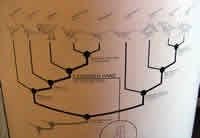
It can be challenging to pick out individual threads from the tapestry of jaw-dropping nuttiness that constitutes the right-wing of the current Republican base. Watching the incoherent, but violent, tempest that was the teabag protest inspired feelings of despair. Here, it seemed, were a mass of people wholly uninterested in fact, in dialogue, who were convinced they knew the truth of how things were. Their desire, from all appearances, was to threaten, to establish that President Obama, and liberals generally, ought to back off, lest they bring repercussions down on themselves.
Yet it is crucial nonetheless to understand the reasons that undergird these seemingly reasonless actions. In the spirit of addressing the question, of what those reasons might be, I submit this recent comment from one Jason Mattera. At the recent Values Voter Summit, Sarah Posner reports
During the panel, Mattera took the David and Goliath metaphor another perverse step: If conservatives (David) smite liberals (Goliath), they will be rewarded with the hot conservative women, just like King Saul promised his daughter to the warrior who slew the evil giant. “You know his daughter must have been beautiful because there’s no guy whose gonna die for an ugly girl,” Mattera chortled. “Our women are hot. We have Michelle Malkin. Who does the left have, Rachel Maddow? Sorry, I prefer that my women not look like dudes.”
Now, there are numerous easy targets in those comments. There is the tiresome insistence that one of the main, if not the main, component of female power and influence is their appearance, specifically their appearance as it interacts with the sex drive of the heterosexual male. This is obviously terrible but also uninteresting. There is the dig at Rachel Maddow for not being attractive like Michelle Malkin (spoiler alert: she doesn’t care if you’re attracted to her, Jason!). The sinister linguistic tic of referring to women in a possessive sense– “our,” “we have,” “my women” –revealing, of course, a certain degree of uncertainty about the degree to which the speaker really has control over the women in his life.
It is no news flash that female freedom terrifies and infuriates the Republicans. The interesting element here is the presumption that sexual attraction must be the underlying factor in David’s decision to fight Goliath. Now, of course we must note that Mattera is likely making a joke. Still, it’s worth remembering the actual reason David fought Goliath: David’s people were at war with Goliath’s. Of course, no one knows how exactly this all went down, but I found it interesting that Mattera, at the Values Voter Summit, emphasized not the religious angle, and not the war/nationalism angle, but the sexy daughter angle.
The thread I am picking at here is the growing trust in emotionality that partly characterizes the recent Republican party. Joe Wilson shouting “You lie!” Glenn Beck weeping. Town hall protestors screaming at their representatives, in some cases expressly hoping to end discussion rather than participate in it. It is a movement that, more and more, relies on the instinctive, passionate, emotional responses to the world. Sexy women are awesome. Ugly women are bad. Obama is black, he is different, he is not to be trusted.
This mindset is, sad to say, awful at all the things a citizen of an advanced nation needs to be doing during a time of crisis and struggle. Complicated issues do not benefit from an emotional consideration.

 Upstairs in the museum, I noticed this interesting illustration among the exquisitely reconstructed dinosaur skeletons. By Odin’s beard! It’s an evolutionary tree of the descent of the Tetanuran (Three-Fingered Hand) dinosaurs. And, as I verified from the skeleton evidence all around me, it seems awfully clear and valid. It also did not seem immediately threatening to the moral development of the many children around me.
Upstairs in the museum, I noticed this interesting illustration among the exquisitely reconstructed dinosaur skeletons. By Odin’s beard! It’s an evolutionary tree of the descent of the Tetanuran (Three-Fingered Hand) dinosaurs. And, as I verified from the skeleton evidence all around me, it seems awfully clear and valid. It also did not seem immediately threatening to the moral development of the many children around me. I visited the Hall of Marine Mammals, where I saw one of my personal favorites. This fellow was staring out at the busy floor, surrounded by a whole bunch of scientifically accurate and thoroughly evolution-drenched material, and everyone seemed to be okay. Indeed, they seemed to be enjoying themselves. I became more and more confused. I didn’t get why people would object to this stuff.
I visited the Hall of Marine Mammals, where I saw one of my personal favorites. This fellow was staring out at the busy floor, surrounded by a whole bunch of scientifically accurate and thoroughly evolution-drenched material, and everyone seemed to be okay. Indeed, they seemed to be enjoying themselves. I became more and more confused. I didn’t get why people would object to this stuff.